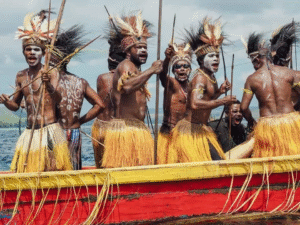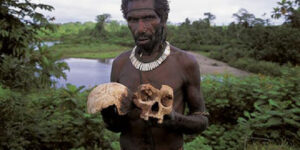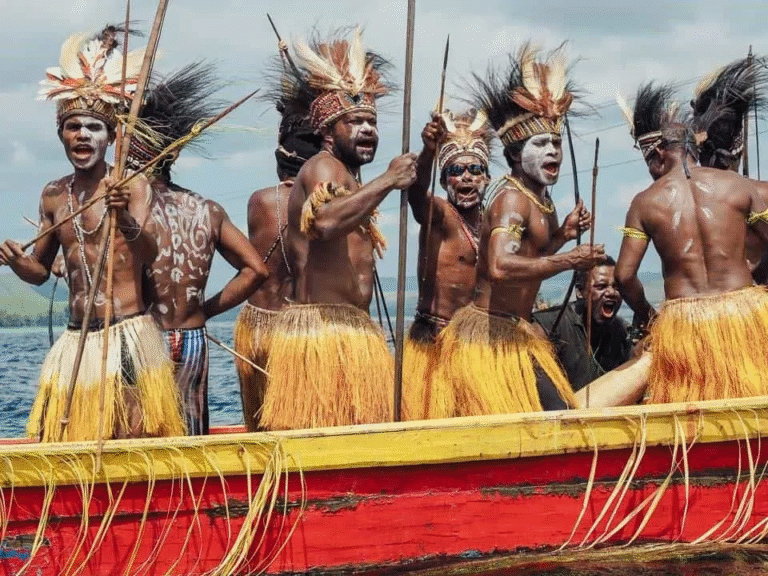
Introduction
On the far eastern edge of Indonesia, in the land where the sun rises first, a cultural revolution is quietly weaving its threads through society—both literally and symbolically. This is the story of the Menoken Movement, a grassroots initiative that has taken root in Merauke, Papua. The movement is not just about a woven bag called noken, but a broader effort to reclaim indigenous identity, embrace cultural pride, and build economic empowerment.
What is the Menoken Movement?
The word Menoken originates from noken, a traditional Papuan woven bag that has long held symbolic and functional significance in indigenous communities. But Menoken is more than just a practice—it’s a philosophy. It reflects sustainability, communal identity, and the generational transmission of wisdom. The Menoken Movement elevates this practice into a contemporary narrative: one that asserts the importance of Papuan traditions in modern times.
The movement is a celebration and revival of indigenous pride, and in Merauke, it has become a growing force that binds together art, identity, politics, and sustainability.
The Cultural Context of Merauke
Merauke is the easternmost city of Indonesia, home to a diverse array of indigenous communities such as the Marind, Kanum, and Muyu. For decades, this region has experienced rapid social changes—migration, modernization, and marginalization. Traditional knowledge systems and cultural practices, including the making of noken, were at risk of being lost.
The Menoken Movement entered the scene as a cultural remedy—reviving traditions in a way that honors the past while providing tools for the future.
The Symbolism of Noken
A noken is not just a bag. In Papuan society, it is:
- A cradle to carry children
- A net to gather harvest
- A vessel of wisdom passed from mother to daughter
- A symbol of respect and social status
- An emblem of peace and identity
In 2012, UNESCO recognized noken as an Intangible Cultural Heritage of Humanity. This acknowledgment brought new global attention to the importance of preserving Papuan heritage.
The Menoken Movement builds on this recognition, urging not just the preservation but the active use and reinvention of the noken as a cultural and economic asset.
Menoken in Merauke: A Local Rebirth
Merauke has seen a surge in young Papuan women returning to their roots. In community halls, weaving workshops, and local schools, menoken has become a verb of empowerment.
In one village, a young Marind woman named Yohana started a noken collective. “Through menoken, I found my identity,” she says. Her group now teaches weaving techniques to children and sells handcrafted noken bags to tourists and online buyers.
This revival brings multiple benefits:
- Economic Empowerment: Women are generating income from noken sales.
- Cultural Revival: Elders share ancestral techniques and stories.
- Environmental Awareness: Noken is made from sustainable natural fibers like orchid bark and tree roots.
- Educational Value: Schools incorporate noken-making into local curriculum.
Intersection with Climate Justice and Sustainability
The Menoken Movement aligns with global climate justice initiatives. In Merauke—where forests are threatened by monoculture plantations—the use of natural fibers for noken represents an act of ecological resistance.
Indigenous Papuan communities have historically maintained a harmonious relationship with the environment. By promoting natural dyeing, forest stewardship, and local materials, Menoken reaffirms traditional ecological knowledge (TEK) as a solution to modern environmental challenges.
A Feminist Dimension: Empowering Papuan Women
In Merauke, where gender inequalities often intersect with economic marginalization, the Menoken Movement provides a rare platform for Papuan women to lead.
Women artisans are now seen as culture bearers, educators, and entrepreneurs. They are invited to national events, speak at universities, and train others. Their voices, long silenced in the public sphere, are being amplified through noken.
The movement redefines femininity, labor, and leadership in Papuan terms—not as imported standards, but as rooted in the land and spirit of the people.
Local Government and Grassroots Collaboration
While the movement began with communities, its momentum has attracted support from various actors:
- Local government has included menoken in cultural preservation agendas.
- NGOs provide funding, materials, and platforms for exhibitions.
- Universities conduct research and documentation of noken weaving practices.
- Digital platforms help artisans sell their products across Indonesia and abroad.
The synergy between bottom-up activism and institutional support has helped Menoken go beyond nostalgia—it becomes a strategic tool for cultural and socio-economic development.
Challenges and Resistance
Despite its achievements, the Menoken Movement in Merauke faces significant challenges:
- Commercialization vs. Authenticity: There is a risk of cultural commodification when traditional practices are sold without context.
- Material Scarcity: Overharvesting of natural fibers may harm ecosystems if not managed sustainably.
- Intergenerational Gaps: Some youth still view indigenous traditions as outdated.
- Gender Barriers: Male-dominated cultural hierarchies may resist female leadership in the public cultural sphere.
Addressing these requires inclusive education, ethical tourism, and ongoing dialogue between elders, youth, government, and civil society.
The Echo Beyond Merauke
Though rooted in Merauke, the Menoken Movement is echoing across Papua and Indonesia. In Jayapura, artists have started digital noken designs. In Jakarta, Papuan students hold workshops on sustainable fashion with noken-inspired elements. Across the archipelago, there is growing respect for indigenous knowledge.
It shows how a local tradition, when honored and reimagined, can offer answers to global questions of sustainability, gender, and identity.
The Power of Cultural Movements
Cultural revival movements like Menoken are more than artistic gestures—they are acts of political and social assertion. They say:
- “We are here.”
- “Our culture is alive.”
- “Our knowledge matters.”
- “Our future is in our own hands.”
In Merauke, the Menoken Movement proves that the path to empowerment can be woven—thread by thread, story by story, generation by generation.
Conclusion: Weaving the Future from the Past
The Menoken Movement is not merely about bags or weaving. It is a reflection of a people’s desire to be seen, heard, and respected. In Merauke, this movement has become a light of cultural resurgence, environmental stewardship, and women’s empowerment.
As Indonesia grows, let us not forget its roots—woven in the forests of Papua, carried on the backs of grandmothers, and now proudly worn by a new generation.
Let us keep weaving, keep remembering, and keep walking forward—together.








